Useni Eugene Perkins (September 13, 1932 – May 7, 2023) was an American poet, playwright, activist and youth worker. [1] He is known for his poem "Hey Black Child". [2]
Useni Eugene Perkins (September 13, 1932 – May 7, 2023) was an American poet, playwright, activist and youth worker. [1] He is known for his poem "Hey Black Child". [2]
Useni Eugene Perkins was born on September 13, 1932, in Chicago, Illinois, to Marion Perkins, a sculptor, and Eva Perkins. When Perkins was 11 years old, his father took him to see Shakespeare's Othello performed by Paul Robeson. Perkins credits his father's efforts to expose his young son to the arts as an early major influence on Perkins' writing career. [3]
In 1950 Perkins graduated from Chicago's Wendell Philips High School before going on to earn his B.S. in group social work (1961) and an M.S. in administration (1964) from George Williams College. Shortly thereafter, Perkins began working at the Henry Horner Chicago Boys Club, which launched his lifelong career of social and educational work with youth from low-income urban areas. In 1966, Perkins became the Director and then later the Executive Director of the Better Boys Foundation Family Center in Chicago, a position he held for nearly 20 years (1966–1982). During this time he authored many creative and academic written works detailing experiences from his childhood and his observations as a social worker. [4]
The Chicago Public Library, which houses an extensive archive of Perkins' written works and biographical material, mentions, "In viewing this collection as a whole it is clear that Perkins worked wonders to fuse his professional career as a social worker with his creative expression as a writer. His plays were primarily focused on presenting positive role models and lessons geared toward urban youth." [5] Throughout his career, Perkins was recognized as a social worker, an artist, and a community leader. He was invited to the Chicago Department of Cultural Affairs Advisory Board (1984), the Chicago Board of Education Task Force on Gangs (1981), and Illinois Governor James R. Thompson's Special Task Force on Troubled Youth (1980).
Perkins was highly influenced by the Black Arts Movement, which at its peak during the 1960s and 1970s was a cultural program that grew out of the Civil Rights and Black Power movements. Perkins was an early and influential activist in the Organization of Black American Culture (OBAC), the Chicago-based expression of the Black Arts Movement. [6] Perkins died on May 7, 2023, at the age of 90. [7]
Useni Eugene Perkins is the author of "Hey Black Child", a poem that has been well-known in Black American households since the mid 1970s. The poem was originally a song that was performed during The Black Fairy, a play written by Perkins in 1974. Following the play's success, Perkins' brother Toussaint Perkins published a poster with the lyrics to "Hey Black Child", but only cited Perkins' first name "Useni" on the poster. This may have led to some confusion as the poem has been incorrectly attributed to Maya Angelou and Countee Cullen. In 2017, Perkins published a children's book with an illustrated version of the poem. [8]

Franklin Rosemont (1943–2009) was an American poet, artist, historian, street speaker, and co-founder of the Chicago Surrealist Group. Over four decades, Franklin produced a body of work, of declarations, manifestos, poetry, collage, hidden histories, and other interventions.

Gwendolyn Elizabeth Brooks was an American poet, author, and teacher. Her work often dealt with the personal celebrations and struggles of ordinary people in her community. She won the Pulitzer Prize for Poetry on May 1, 1950, for Annie Allen, making her the first African American to receive a Pulitzer Prize.
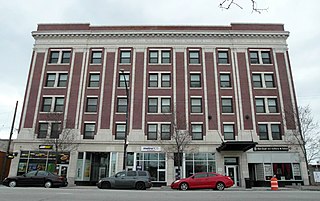
Woodlawn is a neighborhood on the South Side of Chicago, Illinois, located on and near the shore of Lake Michigan 8.5 miles (13.7 km) south of the Loop. It is one of the city's 77 municipally recognized community areas. It is bounded by the lake to the east, 60th Street to the north, King Drive to the west, and 67th Street to the south, save for a small tract that lies south of 67th Street between Cottage Grove Avenue and South Chicago Avenue. Local sources sometimes divide the neighborhood along Cottage Grove into "East" and "West Woodlawn."
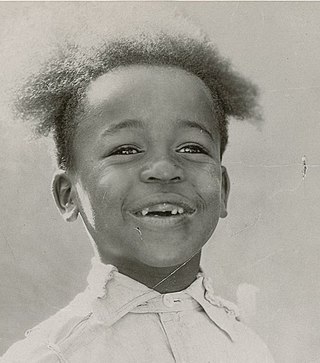
Eugene W. Jackson II was an American child actor who was a regular of the Our Gang short series during the silent Pathé era.
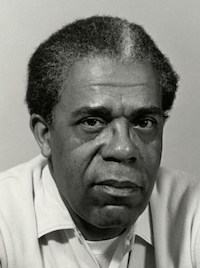
Dudley Randall was an African-American poet and poetry publisher from Detroit, Michigan. He founded a pioneering publishing company called Broadside Press in 1965, which published many leading African-American writers, among them Melvin Tolson, Sonia Sanchez, Audre Lorde, Gwendolyn Brooks, Etheridge Knight, Margaret Walker, and others.
The Almighty Black P. Stone Nation is an American street gang founded in Chicago. The gang was originally formed in the late 1950s as the Blackstone Rangers. The organization was co-founded by Eugene Hairston and Jeff Fort. In later years, under Fort's leadership, an Islamic faction of the gang emerged, naming themselves the "El Rukn tribe of the Moorish Science Temple of America" . They eventually started describing themselves as Orthodox Sunni Muslims. Jeff Fort changed their fort name from El Rukn Moorish Science Mosque, to El Rukn Sunni Masjid al-Malik.
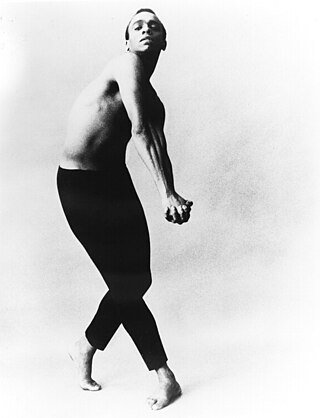
Donald McKayle was an American modern dancer, choreographer, teacher, director and writer best known for creating socially conscious concert works during the 1950s and '60s that focus on expressing the human condition and, more specifically, the black experience in America. He was "among the first black men to break the racial barrier by means of modern dance." His work for the concert stage, especially Games (1951) and Rainbow Round My Shoulder (1959), has been the recipient of widespread acclaim and critical attention. In addition, McKayle was the first black man to both direct and choreograph major Broadway musicals, including the Tony Award-winners Raisin (1973) and Sophisticated Ladies (1981), and he worked extensively in television and film. As a young man he appeared with some of the twentieth century's most important choreographers, including Martha Graham, Anna Sokolow, and Merce Cunningham, and in some of Broadway's landmark productions, including House of Flowers (1958) and West Side Story (1957), where he served for a time as the production's dance captain. A Tony Award and Emmy Award nominee, McKayle held an endowed chair for the last decades of his life in the Dance Department at UC Irvine, where he was the Claire Trevor Professor of Dance. He previously served on the faculties of Connecticut College, Sarah Lawrence College, and Bennington College.

Haki R. Madhubuti is an African-American author, educator, and poet, as well as a publisher and operator of black-themed bookstore. He is particularly recognized in connection with the founding in 1967 of Third World Press, considered the oldest independent black publishing house in the United States.
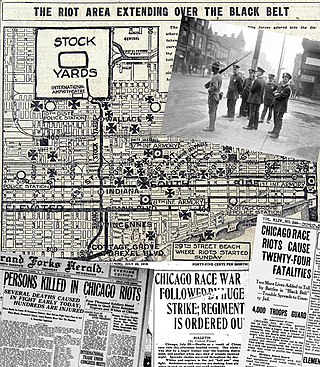
The Chicago race riot of 1919 was a violent racial conflict between white Americans and black Americans that began on the South Side of Chicago, Illinois, on July 27 and ended on August 3, 1919. During the riot, 38 people died. Over the week, injuries attributed to the episodic confrontations stood at 537, two-thirds black and one-third white; and between 1,000 and 2,000 residents, most of them black, lost their homes. Due to its sustained violence and widespread economic impact, it is considered the worst of the scores of riots and civil disturbances across the United States during the "Red Summer" of 1919, so named because of its racial and labor violence. It was also one of the worst riots in the history of Illinois.

Frank Marshall Davis was an American journalist, poet, political and labor movement activist, and businessman.
Angela Jackson is an American poet, playwright, and novelist based in Chicago, Illinois. Jackson has been a member of the Organization of Black American Culture (OBAC), a community that fosters the intellectual development of Black creators, since 1970. She has held teaching positions at Kennedy-King College, Columbia College Chicago, Framingham State University, and Howard University. Jackson has won numerous awards, including the American Book Award, and became the fifth Illinois Poet Laureate in 2020.

Tyehimba Jess is an American poet. His book Olio received the 2017 Pulitzer Prize for Poetry.
Eugene B. Redmond is an American poet, and academic. His poetry is closely connected to the Black Arts Movement and the city of East St. Louis, Illinois.

Chicago literature is writing, primarily by writers born or living in Chicago, that reflects the culture of the city.
The Organization of Black American Culture (OBA-C) was conceived during the era of the Civil Rights Movement by Hoyt W. Fuller as a collective of African-American writers, artists, historians, educators, intellectuals, community activists, and others. The group was originally known as Committee for the Arts (CFA), which formed in February 1967 in Southside Chicago, Illinois. By May 1967, the group became OBAC and included Black intellectuals Hoyt W. Fuller, the poet Conrad Kent Rivers, and Gerald McWorter. OBAC aimed to coordinate artistic support in the struggle for freedom, justice and equality of opportunity for African Americans. The organization had workshops for visual arts, drama, and writing, and produced two publications: a newsletter, Cumbaya, and the magazine Nommo.

Hilda Worthington Smith was an American labor educator, social worker, and poet. She is best known for her roles as first Director of the Bryn Mawr Summer School for Women Workers in Industry and as a co-founder of the Affiliated Schools for Workers, although she also had a long career in government service supporting education for underserved groups including women, laborers, African-Americans and the elderly.
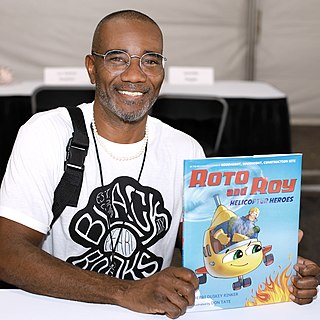
Don Tate is an American author and illustrator of books for children. Tate creates both fiction and nonfiction picture books, with a focus on the biographies of little-known historical figures. He is also a strong advocate for more literature that reflects and honors the lives of all young people. He notes that as a child he had to read the encyclopedia to discover a multicultural world; based on the children's books of his day he "thought the world was white". He co-founded the Brown Bookshelf, a blog designed to push the awareness of African Americans writing and illustrating books for young people. Tate also assisted in the #WeNeedDiverseBooks campaign to help put more books featuring diverse characters into the hands of readers.

Abena Joan Brown (1928-2015) was an African-American businesswoman and theater producer who founded the Creative Arts Foundation in Chicago to enable black artists to work. Known as the "mother of Chicago's black arts community", she received honors and awards for her work in both theater and social programs. Brown was inducted into the Chicago Women's Hall of Fame and interviewed as a subject of the archival program The HistoryMakers.
William Thacker McBride Jr. was an African-American artist, designer and collector. McBride began his career in the 1930s in the circles of black art collectives and artistic opportunities afforded by the Works Progress Administration. He would ultimately leave his mark in Chicago as a driving force behind the South Side Community Art Center. McBride distinguished himself as a teacher, as a cultural and political activist, and as a collector of African art and artwork by black artists of his generation.
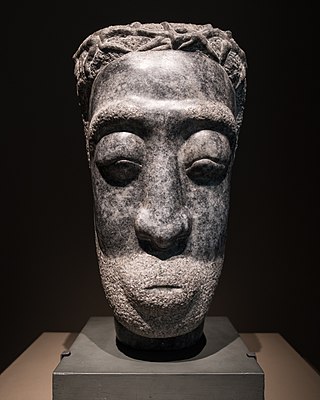
Marion Marche Perkins was an American sculptor who taught and exhibited at Chicago's South Side Community Art Center and exhibited at the Art Institute of Chicago. Perkins is widely considered an important artist of the Chicago Renaissance.